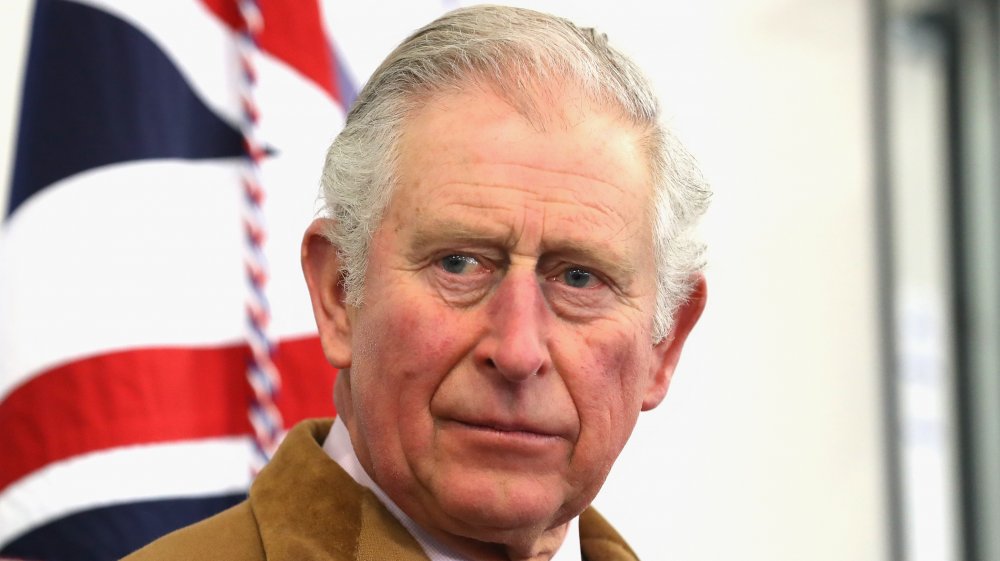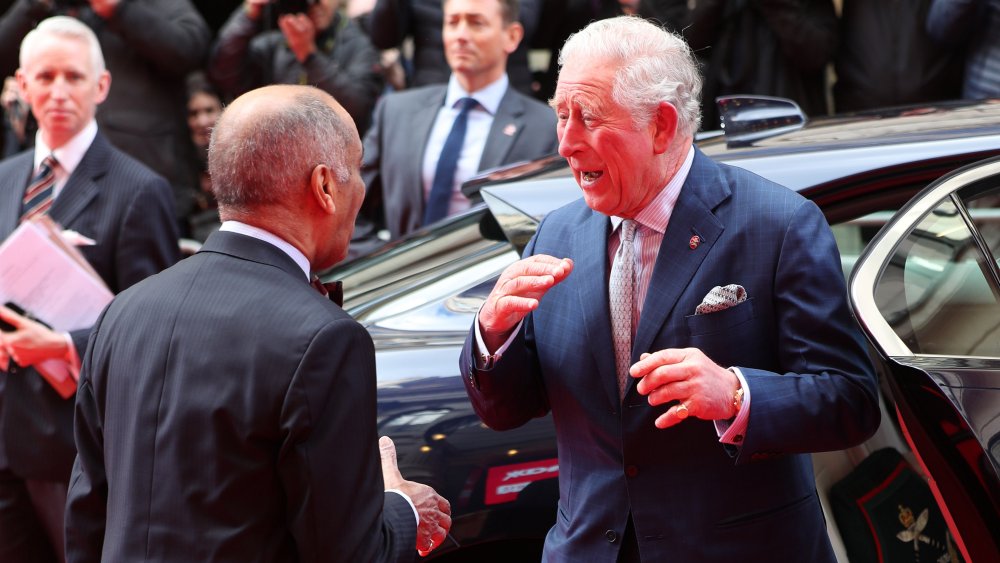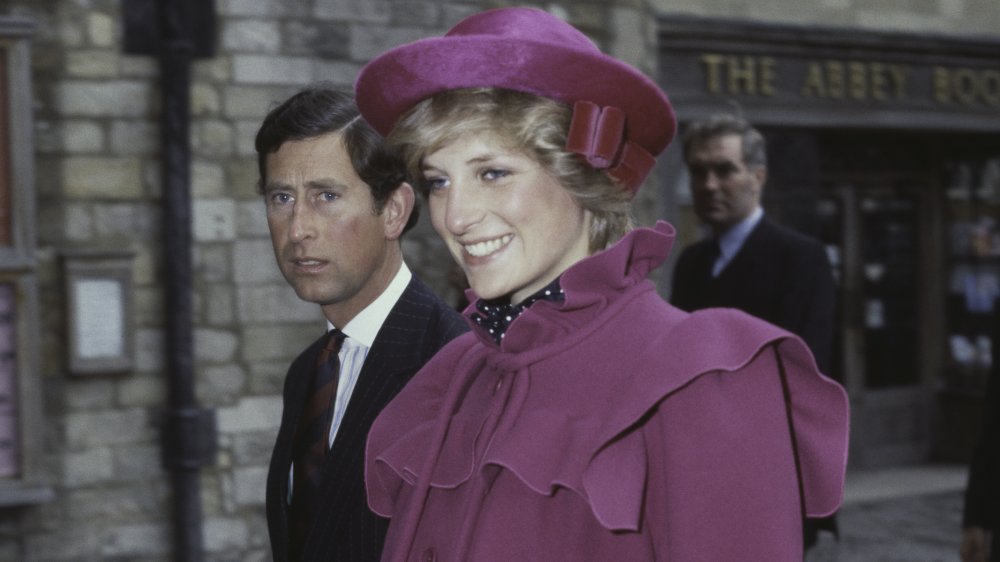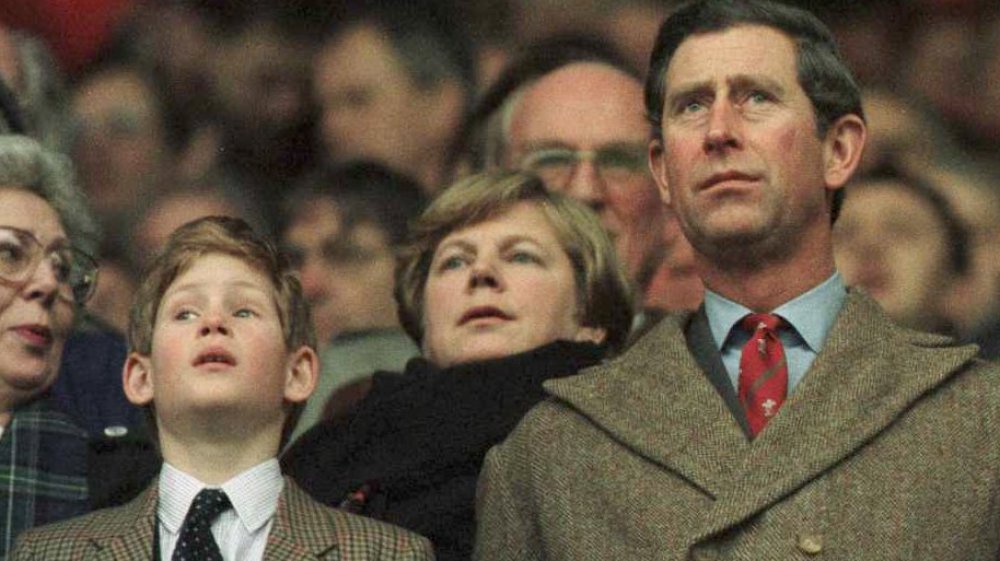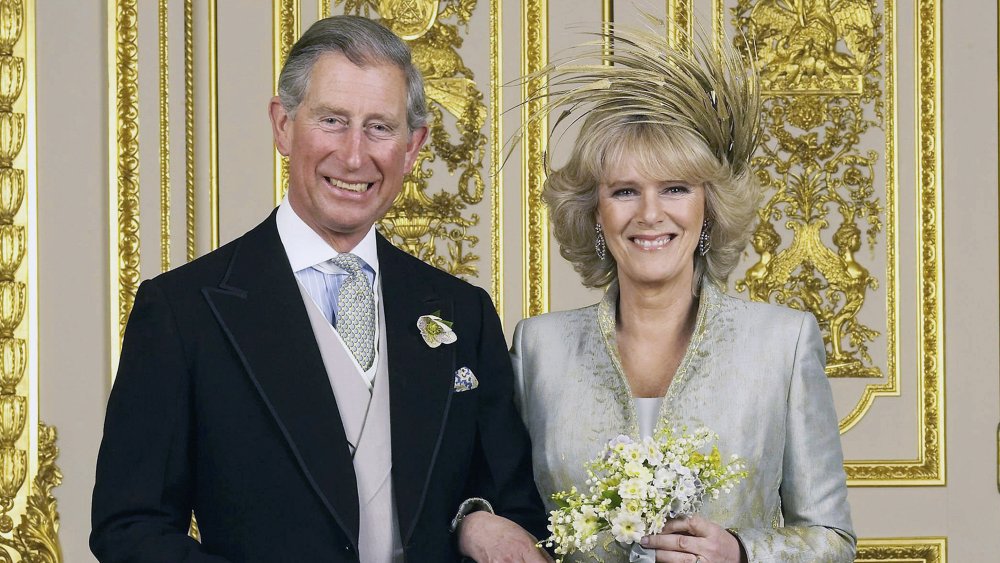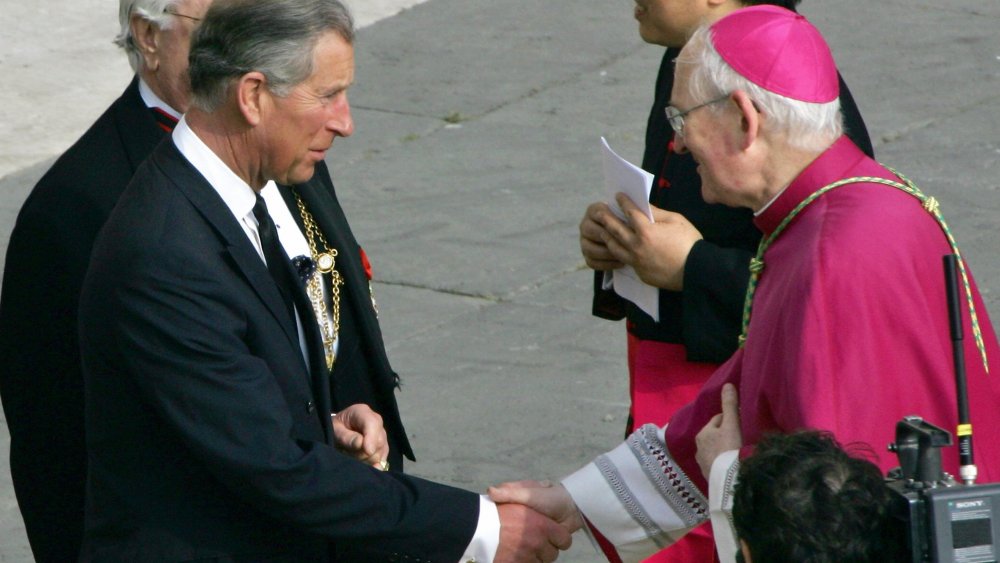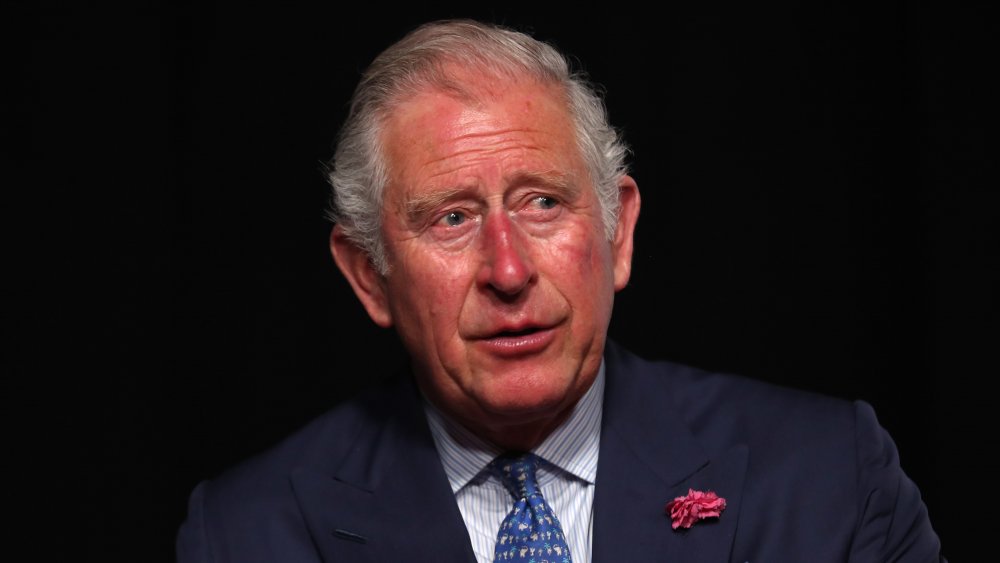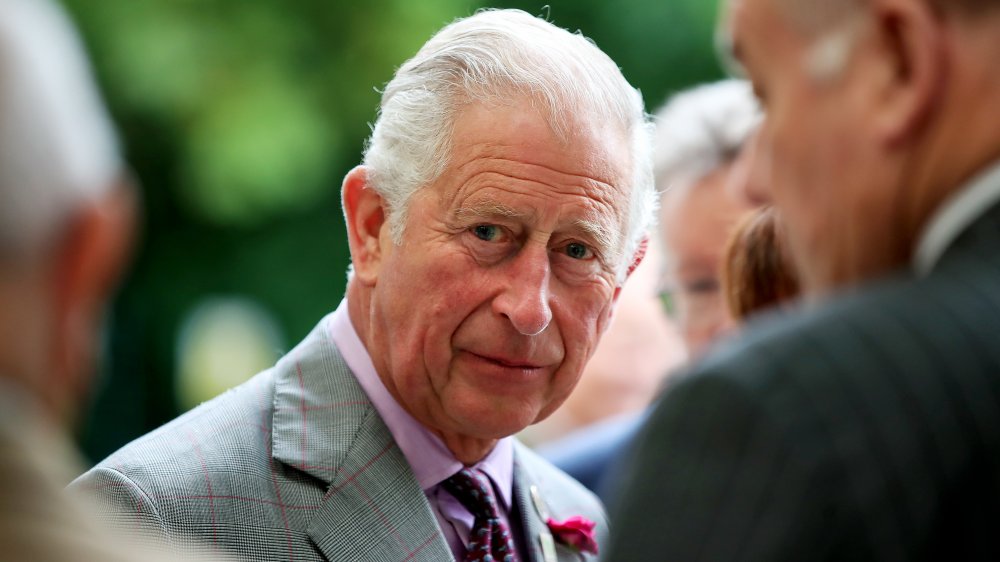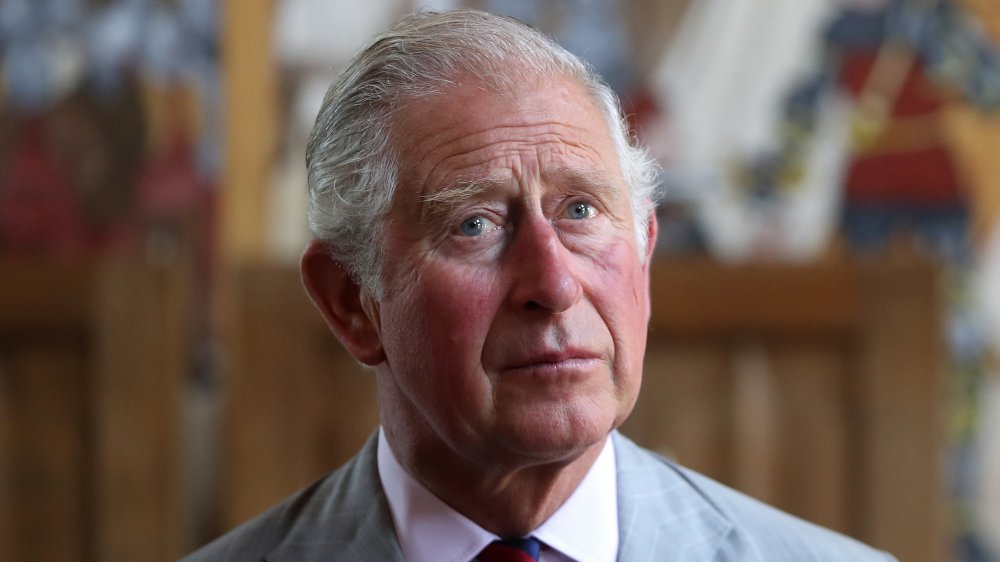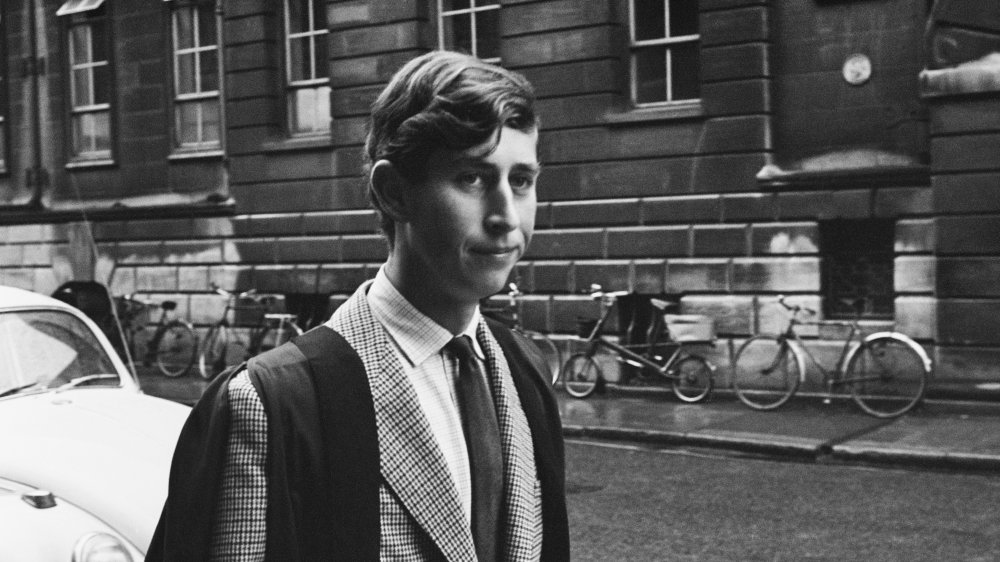The Untold Truth Of Prince Charles
His mother is the longest-reigning British monarch in history, but Prince Charles has also been playing the game of thrones for a long time now. Queen Elizabeth II's eldest son and heir apparent turned 70 in 2018, yet he's shown no signs of slowing down: the Prince of Wales was deemed the hardest-working royal in 2019 in terms of engagements, attending an incredible 521 public events. His sister, Princess Anne, traditionally tops this table, but Prince Charles has been particularly busy in recent years. Some royal insiders have even suggested that he's already become a "shadow king" behind the scenes, slowly taking the reins from his mother as she eases her way into retirement. "Planning for Charles to become king has been going on for some time," a source cited by The Sun claimed in 2019. "A transition is plainly already underway."
It seems as though Prince Charles has been doing his best to give his reputation a quick spit shine before his coronation day comes. However, there are some things the future king will never be able to erase. From his boyhood woes to scandalous affairs, this is the untold truth of Prince Charles.
Prince Charles was the first British royal to test positive for coronavirus
The number of COVID-19 cases in the UK was still relatively low when the Prince's Trust Awards went ahead in London on March 11, 2020, but a spike in numbers seemed inevitable. To help combat further spread, a no handshake rule was put in place for the event — a rule that Charles himself almost broke on more than one occasion. The Trust's founder offered his hand to Sir Kenneth Olisa, Lord-Lieutenant of Greater London, the second he stepped out of the car, but he luckily remembered himself at the last moment and offered a "Namaste" greeting instead. He did the exact same thing again moments later as he made his way up the red carpet. "I do it all the time," the Prince of Wales was heard saying, the Independent reported.
Prince Charles was praised by The Oprah Magazine for adopting a non-contact greeting at engagements. However, on March 25, 2020, Clarence House confirmed that the Prince of Wales had tested positive for coronavirus. "In accordance with government and medical advice, the prince and the duchess are now self-isolating at home in Scotland," the statement read (via BBC News). "It is not possible to ascertain from whom the prince caught the virus owing to the high number of engagements he carried out in his public role during recent weeks."
At the time, Prince Charles had displayed some mild symptoms of the virus, but was in "good health" otherwise.
How an act of murder brought Prince Charles and Princess Diana together
Prince Charles and Princess Diana famously met just 13 times before they tied the knot in 1981. According to the People's Princess, Charles almost blew his chance on their very first meeting. She told her public speaking coach, Peter Settelen, in a candid 1993 interview that she was "unimpressed" with her future husband at the time, and only agreed to see him for a second time after Lord Mountbatten, the Queen's cousin, was killed in an IRA bombing. Diana had noticed the Prince of Wales at the funeral and couldn't help but feel for him. They met again, and this time, there was a spark.
"He chatted me up," Princess Diana recalled (via The Guardian). "He was all over me like a bad rash. Later at a barbecue we were sitting on this bale of hay together and we were chatting about his girlfriend and Mountbatten and I said: 'You must be so lonely.'" The way Diana told it, she knew that she had Prince Charles on the hook at this stage. "He was all over me for the rest of the evening," she told Settelen. "He followed me like a puppy." The future king reportedly became even more interested when Princess Diana rejected an invitation to Buckingham Palace, telling him that she had better things to do than sit around watching him work. "I was quite a challenge," she told Settelen.
Prince Charles was reportedly 'disappointed' when Prince Harry was born
According to Princess Diana's biographer, Andrew Morton, Prince Charles desperately wanted his second child to be a girl. Morton learned this during a 1991 interview with the princess, who revealed that their marriage "went down the drain" fast after the birth of Prince Harry ... and it was apparently Charles' reaction to the birth that pushed his partner to her breaking point. The late princess knew that she was having another boy — "I saw on the scan," she told Morton (via The Sun) — but decided to keep it a secret, believing that Prince Charles would be disappointed. According to Princess Diana, her prediction came true.
In Morton's book, Diana: Her True Story, the princess revealed that the Prince of Wales' first words to her after she gave birth to royal baby No. 2 were reportedly, "Oh God, it's a boy." He would later claim that he had been joking, but according to Princess Diana, Prince Charles (who also made a comment about Prince Harry's ginger hair, she claimed) expressed regret yet again at the christening, reportedly telling Diana's mother that he was "so disappointed" when he learned that they had another boy.
"We thought it would be a girl," Prince Charles supposedly added, which apparently didn't go down well with his mother-in-law. Princess Diana told Morton that her mother "snapped" at Charles and reminded him that he was "lucky" to have a healthy child, regardless of gender.
Camillagate will haunt Prince Charles forever
According to Princess Diana, the reason she and Prince Charles became destined for divorce was simple: "Well, there were three of us in this marriage, so it was a bit crowded," she famously told BBC News in 1995 (via USA Today), three years after the two split. She was, of course, referring to Camilla Parker Bowles, a woman Charles had fallen for years earlier. The Prince of Wales reportedly rekindled his relationship with Parker Bowles not long after Diana gave birth to Prince Harry, and proof of their affair was laid bare for all to see.
Dubbed "Camillagate" by the British press, an intimate phone call between Prince Charles and his then-mistress was made public in 1989. To say the leak was an embarrassment for the two would be a gross understatement. Both parties were still married at the time, and that was just the tip of the iceberg. The real story here was the content of Charles and Parker Bowles' bedtime chat, which wasn't exactly regal — the prince famously said that he would like to "live inside [her] trousers."
The public sided overwhelmingly with Diana, while Parker Bowles became known as the most hated woman in Britain, vilified as a home wrecker. Charles stood by her, however, and they finally got married in 2005. Neither Queen Elizabeth II nor Prince Philip attended the low-key ceremony, but it was still a historic occasion — Charles was the first future king to marry a divorced woman.
Prince Charles caused outrage with a handshake at Pope John Paul II's funeral
Prince Charles ignited fury in the UK and around the world when he shook the hand of notorious Zimbabwe president Robert Mugabe at the funeral of Pope John Paul II in 2005. Mugabe, described by BBC News as an "independence icon turned authoritarian leader" upon his passing in 2019, was a devout Catholic. However, nobody expected to see him at the Pope's funeral, because the ceremony took place in Vatican City and Mugabe was banned from entering the European Union. The Zimbabwean dodged the travel ban and attended the funeral anyway, surprising a lot of people — Prince Charles, most of all.
According to the Foreign Office, Charles had no idea that he was going to be sitting just one seat away from Mugabe until he was face-to-face with the controversial leader. "The Prince of Wales was caught by surprise and was not in a position to avoid shaking Mr Mugabe's hand," a palace spokesperson told the Independent. "The Prince finds the current Zimbabwean regime abhorrent."
There was a lot of support for Prince Charles from inside the royal household, but not everybody showed sympathy. Labour Party politician Richard Corbett openly criticized Charles for failing to stand up for British values and the victims of Mugabe's regime, saying, "This was a golden opportunity to deliberately and very visibly refuse to shake hands with this man. To fail to do so was, frankly, stupid."
Prince Charles and the Black Spider memos
Royals are supposed to maintain a neutral stance when it comes to politics, but Prince Charles apparently broke that rule over a prolonged period of time. Between September 2004 and April 2005, he wrote a total of 27 letters to various government ministers. These letters, which became known as the "Black Spider memos" because of his distinctive handwriting, were the subject of a legal battle that lasted a decade (via the Independent).
While there were calls for the letters to be shown to the public once their existence was discovered, attorney general Dominic Grieve ruled in 2012 that, because they contained Charles' "most deeply-held personal views and beliefs," they should not be released. Grieve made this decision so that the prince's "political neutrality" wouldn't be undermined when he eventually took the throne — but three years later, the Supreme Court overruled him, determining that there was "no good reason" to keep the memos hidden.
The secret letters were released, and they raised multiple questions about Charles' alleged conduct. According to The Guardian, the correspondence between the Prince of Wales and then-Prime Minster Tony Blair confirmed the extent of "the heir to the throne's lobbying at the highest level of politics." The Black Spider memos showed that Prince Charles had contacted Blair and his ministers regarding everything from fishing to military supplies, and critics pointed out that he appeared to pressure the health secretary on the redevelopment of a hospital, in which his own architecture charity was involved.
Prince Charles' views on alternative medicine often cause controversy
Another big talking point that came about following the publication of the Black Spider memos was Prince Charles' passion for alternative medicine. The Prince of Wales complained about a European Union law that limited the use of herbal medicines throughout the UK in a letter to Tony Blair, urging the then-prime minister to do something about it. It wasn't the first time that Charles' views on medical care made headlines, as he began speaking out in support of Gerson Therapy, a radical alternative for cancer patients, in 2004: instead of chemotherapy, patients would rely on fruit juice, coffee enemas, and vitamin injections.
"I know of one patient who turned to Gerson Therapy having been told she was suffering from terminal cancer and would not survive another course of chemotherapy," Prince Charles claimed at a packed healthcare conference (via The Guardian). "Happily, seven years later, she is alive and well. So it is vital that, rather than dismissing such experiences, we should further investigate the beneficial nature of these treatments."
The prince isn't alone in his support of Gerson Therapy, but he's certainly in the minority. According to the American Cancer Society's website, this seemingly natural technique can actually be very harmful: "Coffee enemas have been associated with serious infections, dehydration, constipation, colitis [...] and even death." Despite heavy criticism, Charles' belief in alternative treatments remains as strong as ever — he was named patron of The Faculty of Homeopathy in 2019.
The Prince of Wales' Paradise Papers scandal
In 2017, German newspaper Süddeutsche Zeitung got hold of a colossal leak that lifted the lid on the scale of offshore banking among the world's elite. Per The Guardian, this outlet was sent a whopping 13.4 million documents, which would become known as the Paradise Papers due to the locations of these accounts (Bahamas, Barbados, Bermuda, and the Cayman Islands being prime examples). The papers ranged from 1950 to 2016, and covered everything from big companies (Apple, Nike, and Facebook) to individual celebrities. Prince Charles was named in the papers, and while he technically hadn't done anything illegal, big questions were raised when one shady-looking investment was discovered.
The leak revealed that the Duchy of Cornwall, Charles' private estate, had purchased shares in a Bermuda-based company worth around $113,500. There's nothing wrong with that, of course, but what got people talking was the fact that this company would benefit hugely from an alteration to climate change rules, a change for which Charles himself had reportedly been lobbying.
"There's a conflict of interest between his own investments of the Duchy of Cornwall and what he's trying to achieve publicly," Sir Alistair Graham, former chairman of the Committee on Standards in Public Life, told BBC News. "And I think it's unfortunate that somebody of his importance, of his influence, becomes involved in such a serious conflict." The palace brushed off the story, pointing to the fact that Charles has been an advocate for climate change action for decades.
Prince Charles was relentlessly bullied at boarding school
Letters written by the late Queen Mother to her daughter, Queen Elizabeth II, confirmed that she wanted Prince Charles to be educated at Eton, which she described as "the ideal school for one of his character and temperament." However, Prince Philip wanted her beloved grandson to attend the same institution he did, the notoriously tough Scottish boarding school, Gordonstoun. "He would be terribly cut off and lonely in the far north," the Queen Mother warned, and she was right. Ignoring all protests, Philip sent Charles to Gordonstoun, and what the younger prince later described as his "prison sentence" began.
According to his contemporaries, Charles was relentlessly targeted at Gordonstoun. School rules were tightened ahead of his arrival, and his classmates reportedly took their frustrations out on the prince. "He was bullied," late Daily Mail correspondent Ross Benson claimed. "He was crushingly lonely for most of his time there. The wonder is that he survived with his sanity intact." While Gordonstoun spoke out after Charles' time at school played out on The Crown, claiming that the prince didn't hate it as much as the Netflix show made out, his former classmates told a different story.
Author and screenwriter William Boyd attended Gordonstoun when Charles was there and alleged, "I happen to know, from his own lips, that Prince Charles utterly detested it." It's worth noting that Princes William and Harry both attended Eton.

